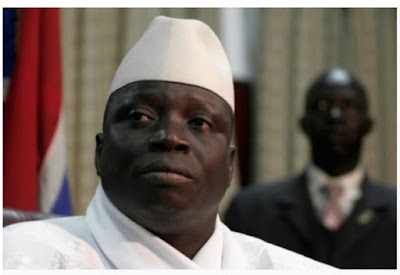The Economic Community of West African States (ECOWAS) has given the embattled President of The Gambia, Mr. Yahya Jammeh, till midnight tomorrow to vacate office and hand over power to the country’s President-Elect, Mr. Adama Barrow, or be ousted by force, it has been gathered.
Though details of the planned military intervention by ECOWAS in The Gambia if Jammeh refuses to vacate office for Barrow on Thursday remains sketchy, it was learnt that ECOWAS has perfected plans to install the president-elect.
Efforts by Jammeh to erect a legal hurdle in the way of the ECOWAS-backed inauguration of Barrow suffered a serious setback yesterday as the country’s Supreme Court declined to hear an application by his party to that effect.
Last Thursday, the country’s ruling Alliance for Patriotic Reorientation and Construction (APRC) filed an application for an interlocutory inj
unction seeking to stop the inauguration of Mr. Barrow as President on January 19.
But the Chief Justice of the Gambia, Justice Emmanuel Fagbenle refused to grant the application.
Barrow was declared winner of the December 1, 2016 presidential election. Jammeh, who had initially accepted defeat by congratulating Barrow, suddenly recanted a week later saying he would challenge the election results at the apex court.
His recant threw the country into confusion amid intervention by African leaders suing for a peaceful transition.
The African Union (AU) and ECOWAS have pledged to withdraw their recognition of Jammeh as President after Thursday.
But Nigerian officials played down the planned military intervention by the sub-region’s power block last night, saying ECOWAS still hoped Jammeh would respect himself and leave office by tomorrow night.
“From what I gathered, they are extending the olive branch till midnight of January 18th. If he does not (handover power) by 19th, the troops will take over,” a Ministry of Foreign Affairs official said last night.
Asked about the composition of troops and Nigeria’s strategic role, the source responded: “I don’t have an idea of the troops but they are from ECOWAS.”
Speaking, however, the Director of Army Public Relations, Brig-Gen. Sani Usman, said he was not aware of plans for military intervention, explaining that such issues fall squarely under the purview of the Ministry of Foreign Affairs and the federal government.
Usman added that the Army could not comment on the matter. “We are not at the forefront of solving the political problem in The Gambia; we are soldiers,” he said.
An official at the Ministry of Defence, Abuja also could not provide an insight on the level of preparedness by the Nigerian military.
But as the inauguration day draws closer, tension appears to have gripped Gambians, with many struggling to leave the tiny West African nation.
Efforts by ECOWAS leaders led by President Muhammadu Buhari to persuade Jammeh to relinquish power has failed to yield any tangible result, even as Barrow relocated to Senegal, where reports suggest he would be brought into The Gambia by ECOWAS troops for the inauguration on Thursday.
Meanwhile, the Supreme Court yesterday refused to hear an application by Jammeh’s party, APRC, to stop the inauguration of Barrow as president on Thursday.
In the application signed by its lawyer, Mr. Edward Gomez, the APRC asked the court for an order of interlocutory injunction preventing the chief judge of the country from inaugurating or swearing in Barrow as the President of The Gambia until the determination of the election petition.
The party also asked for an order “restraining, the President from preparing, arranging, organising, conducting, partaking or participating in any manner or form in the swearing-in and /or inauguration of Adama Barrow as President of the Republic of The Gambia on January 19, 2017.”
The APRC further prayed the court for an order restraining the country’s National Assembly, its members and any organ of government from partaking in the inauguration of Barrow.
It asked the court to stop Barrow from presenting himself to the country’s chief judge or judiciary to be sworn-in as president of The Gambia.
After hearing the application yesterday, the Chief Judge, Justice Emmanuel Fagbenle, a Nigerian, refused to grant the prayers that would have effectively extended the tenure of Jammeh.
The court declined to grant the requests on the ground that the application listed the Chief Judge, who is the only Supreme Court Judge at the moment, as a party in the application.
Fagbenle, therefore, ruled that he could not grant an order against himself.
He said he would remove himself from the suit in the interest of fairness. He then adjourned the election petition until the court is fully constituted.
The court had ruled penultimate Monday that it could not consider the election petition filed by the APRC because the quorum of five judges to hear the petition could not be met because Nigeria and Sierra Leone declined the Gambian request to send judges to sit at the Supreme Court.
The Gambia relies on judges and other judicial officials from other West African countries to help fill its drought of top officials in its judiciary.

